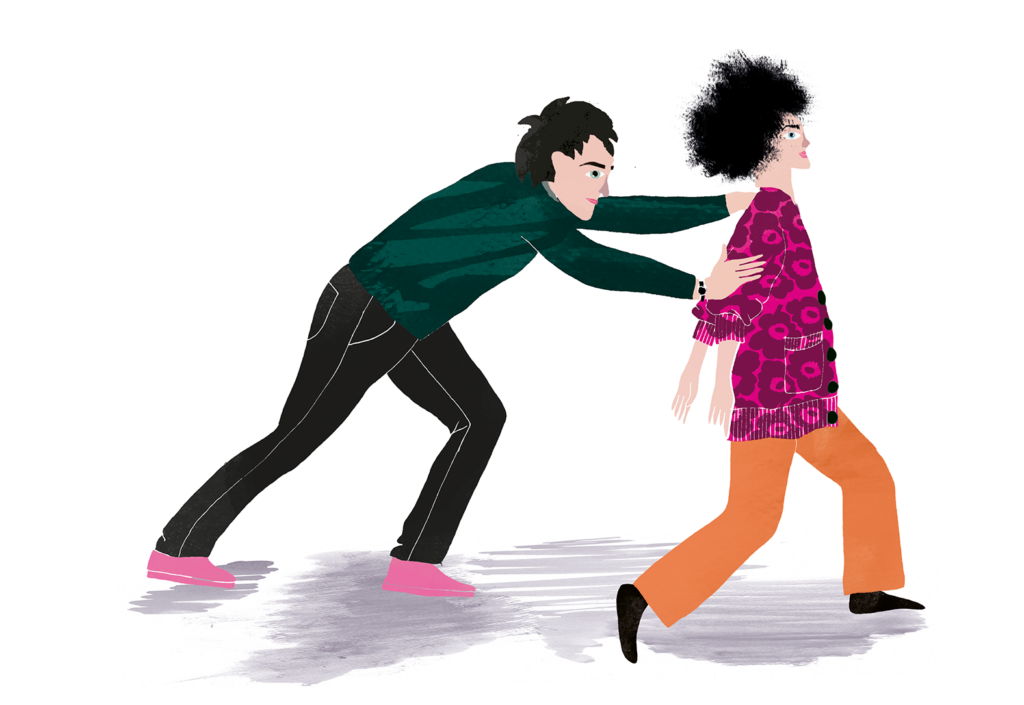A citizen or an expense item? – Young peoples’ needs in society’s institutions often remain under the burden of employment
Self-direction and being able to manage are golden traits in our time, at least from society’s point of view. However, a dissertation conducted at the University of Tampere shows that they drive independent young people and institutions into conflict when young people are fighting for their own existence in the face of labour market.
Original text: Aurora Kuusisto
Graphics: Pauliina Lindell
Translation: Erika Yli-Rahnasto

Tämä artikkeli on saatavilla myös suomeksi.
In the eyes of society’s service system, a young person is not a fully-fledged citizen until they have anchored themselves in working life. The topic has been the subject of a dissertation at the University of Tampere by researcher Jenni Kallio.
”The frames of citizenship are narrow, and you don’t always know how to give value to youth in itself,” Kallio says.
For Jenni Kallio’s dissertation, young people between the ages of 17 and 27, who were reached from the Youth Shelter of the Finnish Red Cross, were interviewed. They were asked how they perceived the forming of their citizenship in the public authority and service system of society. The young people participating in the research had sought support during the period of gaining independence
for questions regarding social work, school health care, mental health and substance abuse services, TE Office (job centre) and Kela (the Social Insurance Institution of Finland).
What can be gathered from the experiences of the young people, the aim of the services was to make the young person seeking support able to work and to work as quickly as possible.
”When negotiating with institutions, the young people felt that they were being guided in their activities to strengthen their labour market potential and to take responsibility for their own well-being,” Kallio says.
According to Kallio, the interviews revealed an interesting observation that in the experiences of the young people, different services formed an entity in which institutions pursued similar goals, in other words to strengthen young peoples’ ability to manage independently and find their place in working life. However, the goals of the institutions contradict partially with young peoples’ own issues.
Even if the basics of life have been bad, pushing a person to work often became the most important thing that could ignore young peoples’ other affairs.
Several young people on the stage of becoming independent found it challenging to manage in the service and authority jungle when the needs for support arose. The support was not necessarily comprehensive and intensive enough in relation to the young person’s own resources. On the other hand, the pressure to educate and succeed in working life was enormous in the eyes of many young people. According to some young people, future-oriented preparations for working life began already in primary school.
Kallio stresses, however, that services do not just fail, but are often a very important resource that supports the everyday lives of young people. Services are a place for young people to get support and learn many skills of working in society, as well as gain reinforcement of their own citizenship.

More appreciation should be given to young people for their activity
According to Kallio, the public debate on young citizens is sometimes dismissive and rough. The media may address young people’s attitudes towards working life and citizenship from a striking starting point.
”We have a really rough debate about young people who are labelled as ideologically unemployed, for example. If young people reflect on life, they may be seen as lazy work avoiders. Young people should have the right to engage in labour market discussions without fear of stigmatisation, and we should take that seriously.”
Kallio emphasises that young people should challenge entrenched views on working life.
“It is a good thing for everyone that working life is pluralistic and good for the environment. The demands of young people are to everyone’s advantage, but the moral ethos of how young people should just be content and progress through poor labour market experiences remains strong.”
Indeed, the key message of the research results is that young people should be seen and identified as citizens in service systems with the right to participate and belong to society, in addition to the responsibilities related to job-seeking and education. Young people themselves often do not feel deprived or isolated, but their own actions remain invisible.
“Young people do a lot of things that increase well-being and improve society. One might wonder whether such civic activity should be seen more strongly as a constructive activity in society, which should also be supported financially in society.”
According to Kallio, current employment policy mainly supports activities that target the labour market, but young peoples’ self-motivated activities, such as voluntary work or other community-based activities, could be identified as valuable activities that build society in the same way. According to Kallio, the employment policy in this regard is not very flexible in its present condition.
The mutual activity and civic participation of young people is subject to invalidation. The message sent to young people in terms of society is often that they do not have enough knowledge and skills to participate in the political debate. Some may be scared to participate in the discussion due to hate speech or stigmatisation. In addition, young people’s own civic activity is limited by the lack of spaces free from commercial interests.
”Young people’s services should be seen broadly as democracy services. Experiences of participation in society arise when young people are heard and understood, and this is where services play a key
role. The experience of citizenship and belonging to society is built on everyday interaction and encounters.”

More time for pondering
Kallio and his colleagues recognised independence as a dense phase of life, when a lot is happening in the lives of young people. Young people then reflect on their own identity and even fairly fundamental questions about their existence. The service system plays an important role in addressing these affairs.
”Young people need time and peace to think about their own choices about independence and their future. Young people hope that schools could give more hands-on teaching on the affairs related to becoming independent and together with them consider what issues need to be resolved. Service encounters should focus on young peoples’ own needs and wishes, and there should be more support for their implementation.”
The most important thing would be to guarantee an independent young person the experience of not being left behind or excluded from services. Kallio emphasises that one should think that no young person is too ill to get support for life choices that they like. All young people have the right to feel that they are valued as citizens and are an important part of society.